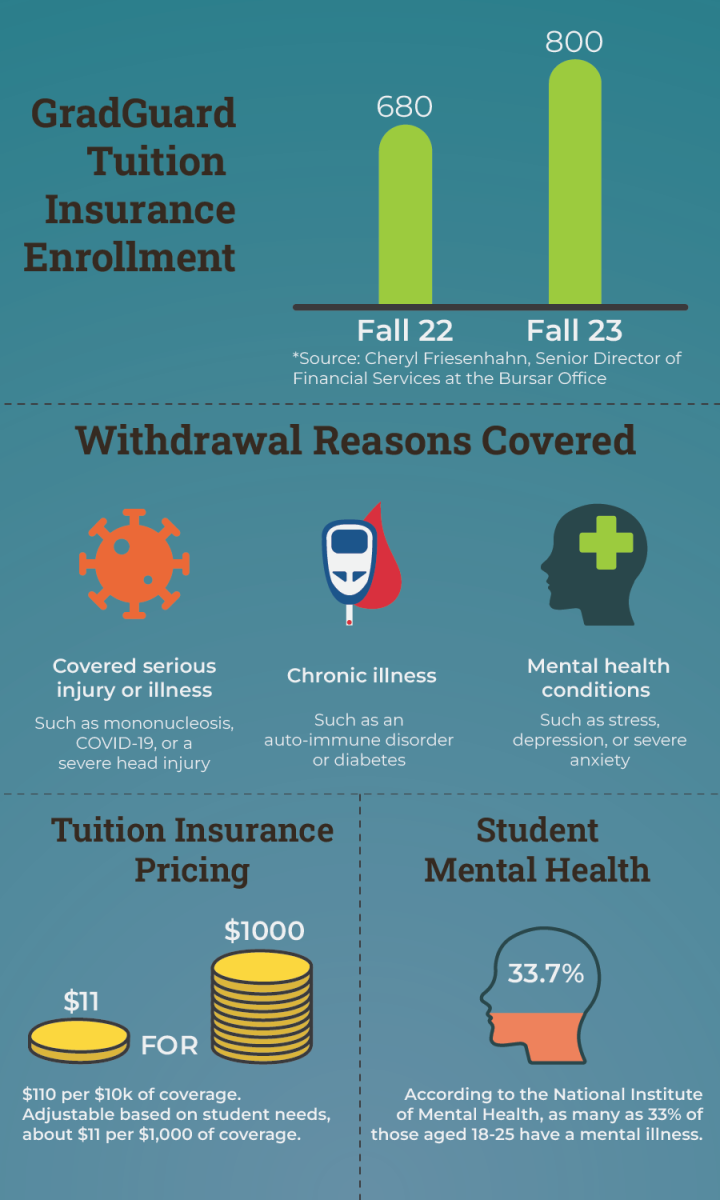UTD has partnered with GradGuard since fall 2022 to offer students tuition insurance that entitles them to a refund in case they must withdraw completely due to chronic illness, unforeseen injury or mental health conditions. Students interested in registering for insurance for the spring 2024 semester must do so before the first day of classes, Tuesday, Jan. 16.
According to Section 54.006 of the Texas Higher Education Code, public institutions must charge a portion of tuition to students who withdraw from courses after the semester has begun; after the first 20 days of the semester, they will get no money back. With GradGuard, students pay $110 for every $10,000 they want insured, and in the case of a full withdrawal can be reimbursed for tuition fees, housing, books and other education-related expenses. Coverage applies in situations where students must withdraw due to illness, emergencies or mental health issues that arise throughout the course of the semester. However, in order to be reimbursed, students must have proof of hospitalization and a recommendation from a medical professional to withdraw.
“We never know when something’s going to happen to us, and so there’s peace of mind that is associated with having insurance,” Cheryl Friesenhahn, senior director of financial services at the Bursar’s Office, said. “[It’s] no different than if you’re purchasing renter’s insurance or car insurance.”
Pre-existing physical conditions are only covered if the insured student did not have any symptoms and was medically able to attend classes at the beginning of the covered semester. Even students who are paying through loans or financial aid are eligible for a refund. However, the insurance only covers money paid out of pocket, so any grants or other money paid directly to the school is not eligible. Specific coverage extends to depression, anxiety and bipolar disorder that may push students to withdraw. These illnesses are particularly common in college students, with adults aged 18-25 facing the highest prevalance of any mental illness at 33.7%, according to the National Institue of Mental Health.
“A lot of it really had to do with mental health issues,” Friesenhahn said. “I felt very strongly that that when I heard [about GradGuard], I heard that they would cover pre-existing conditions, and it wasn’t just a situation where only very, very specific circumstances would be covered.”
Jenna Tempkin, director of the Student Counseling Center, = has worked at UTD for over 10 years and has seen a shift in the issues students struggle with after the COVID-19 pandemic. In the past 3–5 years, Tempkin has seen what used to be issues adjusting and transitioning to UTD become more serious clinical diagnoses of anxiety, depression, PTSD and mood disorders. When students come in dealing with mental health problems, it can affect their interpersonal relationships and academics; the Student Counseling Center works with students to find the right treatment plan for them in order to access proper care.
“When that happens, we of course, as counselors oftentimes do, take the approach of prioritizing mental health because our belief in what we see over and over again is if one doesn’t prioritize their mental health and really work through it, stabilize it, then those other areas are not necessarily going to see a change,” Tempkin said.
After an initial consultation, the Counseling Center will find a proper treatment plan for a student, whether that include individual counseling sessions, group sessions and workshops. If a student begins participating in their treatment plan and counselors determine a need for a nonacademic withdrawal due to mental health, they will provide a letter of support that can then be used for the insurance claim. After withdrawal, the office can continue to offer services if the student plans on enrolling again in the following semester or transition to seeing a professional outside of UTD if they are leaving school.
Student interested in learning about tuition insurance can find more information on the Bursar’s website and resources for supporting their mental health at the Student Counseling Center.





